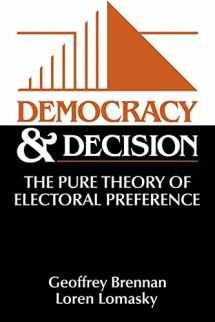
Democracy and Decision: The Pure Theory of Electoral Preference
Book details
Summary
Description
Do voters in large scale democracies reliably vote for the electoral outcomes most in their own interest? Much of the literature on voting predicts that they do, but this book argues that fully rational voters will not, in fact, consistently vote for the political outcomes they prefer. The authors critique the dominant interest-based theory of voting and offer a competing theory, which they term an "expressive" theory of electoral politics. This theory is shown to be more coherent and more consistent with actually observed voting behavior. In particular, the theory does a better job of explaining the propensity of democratic regimes to make war, the predominance of moral questions on democratic regimes to make war, the predominance of moral questions on democratic political agendas, and the distribution of government resources in democratic systems. This important book offers a compelling challenge to the central premises of the prevailing theories of voting behavior and should serve as the basis for fundamental reevaluation in the field.


We would LOVE it if you could help us and other readers by reviewing the book
Book review



